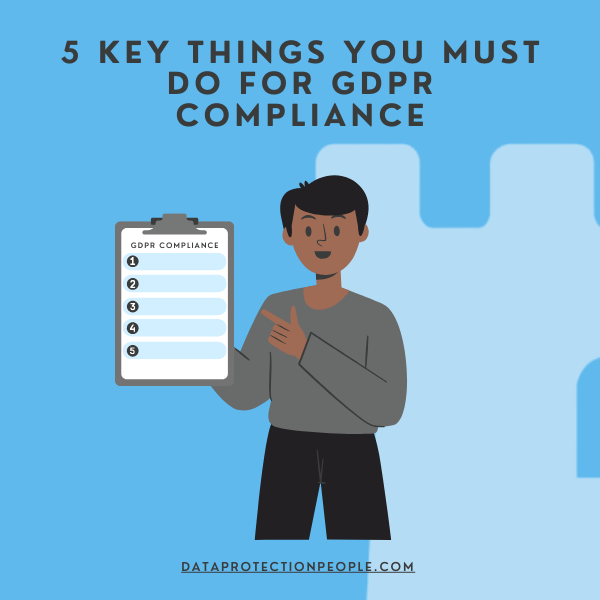5 Key Things You Must Do for GDPR Compliance
Navigating the UK GDPR might be complex, but it doesn’t have to be if you have a GDPR toolkit to help you on your way.

The UK GDPR is a complex legal document with endless text on policies, procedures, principles and rights. For most organisations, this information will go over your head—unless it’s your job.
At Data Protection People, we aim to make data protection simple. So, our experts came together to list the five key things you need to meet and maintain GDPR compliance. Discover what they are below and hear from us on how our GDPR toolkits can simplify this entire process.
What You Need in Place for GDPR Compliance
1. Appointed Data Champion
Data compliance starts from within, so if you don’t have someone with skills to instil best practices, how can you ensure everyone else will follow?
A Data Champion is a designated employee that promotes GDPR awareness and compliance across every department. While this role isn’t required, you should have a champion selected so you don’t need to handle data privacy matters in your own time.
Some organisations will require a Data Protection Officer (DPO), who, like Data Champions, is the central contact for GDPR duties. A DPO’s sole responsibility is to act on behalf of the UK GDPR rather than the organisation’s interests. That’s why outsourcing a DPO is so effective – conflict of interest is never a concern.
For large-scale processing, we recommend having both a DPO and a Data Champion so there is always someone at ground level to ensure compliance.
2. GDPR Policies
One of your main data protection obligations is accountability. You need to be responsible for your compliance, which can be demonstrated by having the right policies in place.
Under the UK GDPR, you should have the following mandatory policies:
- Personal Data Protection Policy – Your data protection policy should set out the rules and procedures that ensure GDPR compliance when handling personal data.
- Privacy Notice – You must disclose how you collect, use, store and protect a customer’s data. Your privacy policy should be freely available to view, i.e., published on your website.
- Employee Privacy Notice – Whether your team is small or big, you need an internal employee privacy policy to establish how you handle their data during and after their work with you.
- Data Retention Policy – You need a clear guideline for how long you keep personal data for compliance and regulatory reasons, including how you’ll dispose of it when no longer required.
Other GDPR policies apply depending on your business and the type of processing you undertake. Contact our data protection consultancy to find out what’s required.
For a complete list of GDPR documentation, visit our latest blog on the policies and procedures needed to be compliant.
3. GDPR Procedures
Following procedures will help your business implement the necessary policies. The UK GDPR has many procedures, from how you conduct a GDPR audit to implementing a Data Protection Impact Assessment (DPIA).
You should have procedures for handling data subject rights, including the right of access (aka SARs) and the right to rectification, erasure and restrict processing.
You must also create a data breach notification procedure, which you will follow in case of a GDPR breach. This is a mandatory requirement and will prove essential should you ever experience one.
In our GDPR Toolkit, we include draft policies, procedures and templates for your organisation to follow. Explore what we cover in our toolkit to help simplify your compliance journey.
4. Regular GDPR Audits
You need to schedule regular GDPR audits to ensure you’re still meeting the requirements of the law. You should conduct these yearly, but if you have high-risk processing operations, you should do it more frequently.
There are 5 crucial steps in a GDPR audit such as data mapping, gap analysis and optimisation. You can conduct these yourself, but an independent assessor is the best person to audit your business.
5. Data Protection Training
GDPR awareness training is a must for every business, no matter the size of your team or the processing scale. Over the last year, the ICO has seen data breaches caused by human error. GDPR training will minimise this risk by equipping your team with the skills and knowledge to handle personal data.
At Data Protection People, we offer courses on all critical areas of the GDPR, including DPIAs, SARs, RoPAs and more. We offer training all year round, so contact our team if you would like to get booked in.
What Is the Best GDPR Toolkit?
Complying with the UK GDPR is not simple. There’s a lot involved, so where do you begin? We’ve created a GDPR toolkit that covers all the resources you need to simplify data compliance.
As all businesses vary, we offer GDPR toolkits for SMEs and enterprises with complex processing requirements. We also offer a tailored solution that aligns with your organisation’s goals and scalability needs.
You’ll have access to drafted policies, procedures, checklists and templates. See what’s included in our GDPR toolkit, or contact us today to build your own.
Why Should You Use a GDPR Toolkit?
Our GDPR toolkit simplifies compliance by providing:
- Comprehensive policies: Access ready-made mandatory and recommended policies to ensure complete coverage.
- Time-saving templates: Spend less time creating forms, checklists and records with drafted templates that are easy to use and edit.
- Streamlined procedures: Access all the documentation you need to become GDPR compliant with procedures that clearly outline the next steps.
- Incident management: Implement GDPR best practices with appropriate procedures and policies that minimise data misuse or loss.
Contact Our Data Protection Consultancy Today
Need GDPR support? Whether you require an extra hand or an outsourced DPO, our data protection consultancy is here to help. Contact our team to learn how we can support you.
